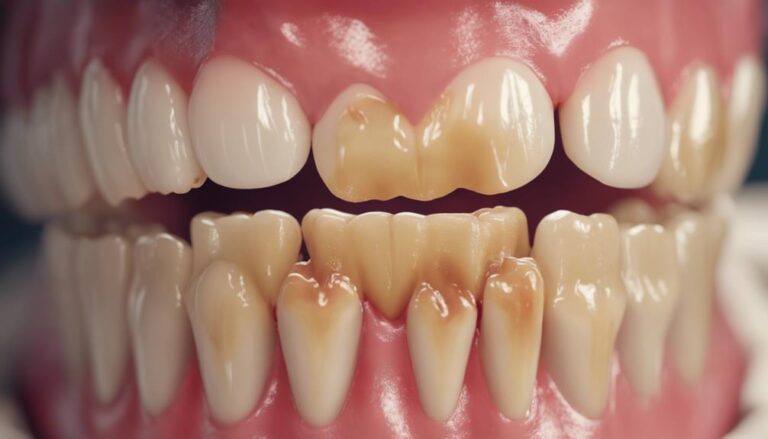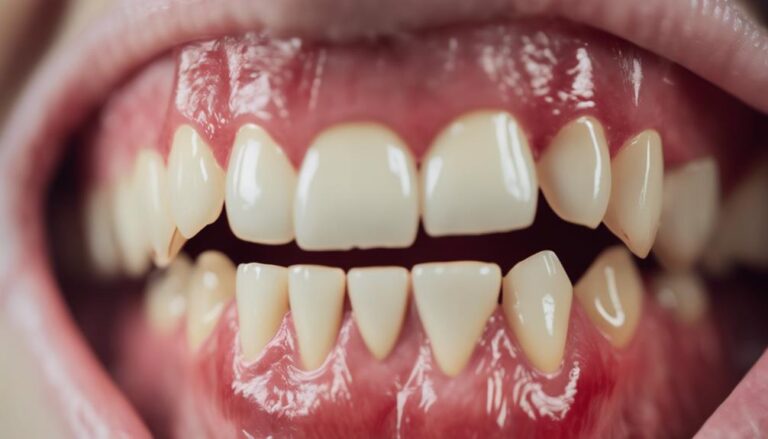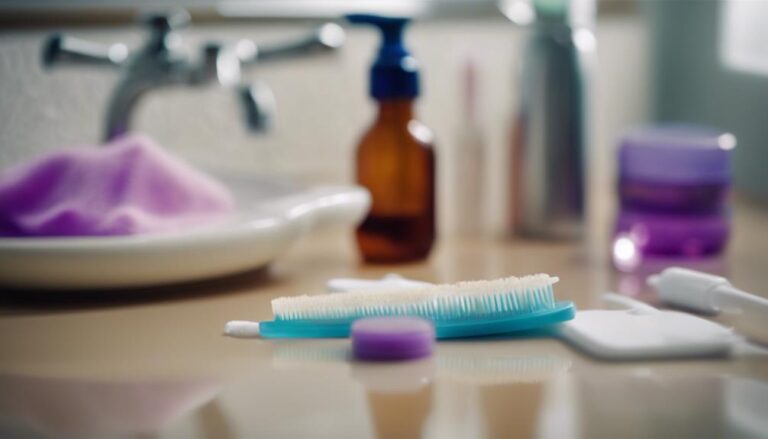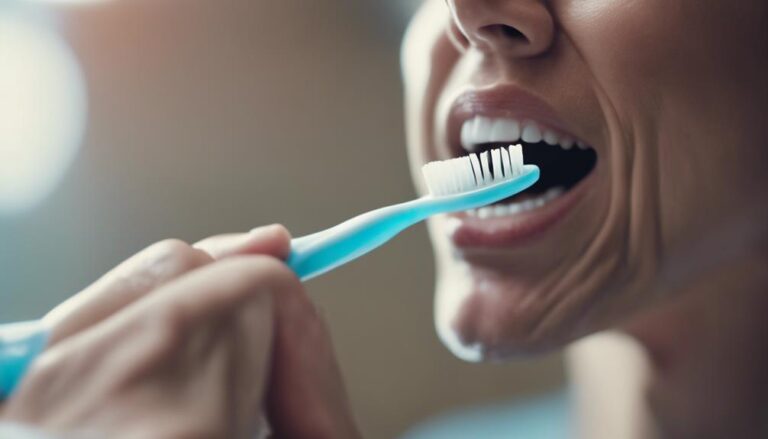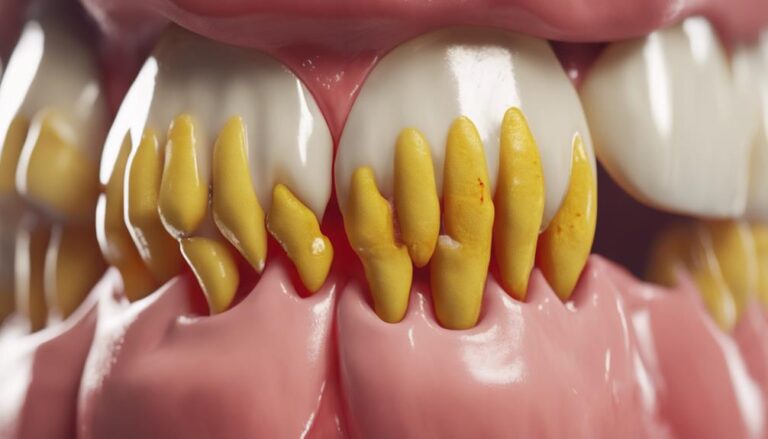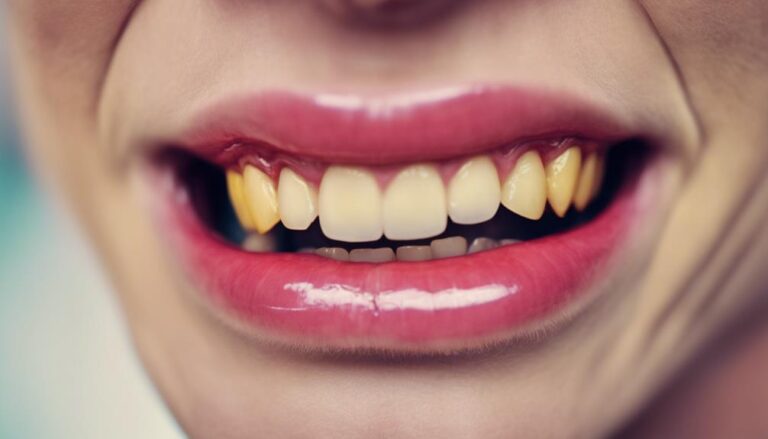Maintaining good oral hygiene is crucial for combating bad breath. Brush with a soft-bristled brush at a 45-degree angle for two minutes using fluoride toothpaste. Floss daily in a gentle C shape before bedtime. Scrubbing your tongue removes bacteria, enhancing taste and breath freshness. Choose mouthwash wisely to complement brushing and flossing, and opt for sugar-free gum. Stay hydrated, nibble on nutrient-rich snacks, and limit sugary foods. Regular dental visits every six months catch issues early. Quit smoking and consider oral probiotics for a balanced mouth. Implementing these habits guarantees fresh breath and overall oral health.
Key Takeaways
- Brush and floss regularly using proper techniques.
- Clean your tongue daily to remove bacteria.
- Use mouthwash and gum with antibacterial properties.
- Stay hydrated and maintain a balanced diet.
- Visit the dentist biannually for professional care.
Brushing Techniques
When brushing your teeth, it’s important to use proper techniques to effectively remove plaque and maintain fresh breath. Start by selecting a toothbrush with soft bristles and a size that fits comfortably in your mouth.
Angle the bristles at 45 degrees towards the gum line to clean along the gum margin and tooth surface simultaneously. Apply gentle pressure to avoid damaging the gums while making small circular or back-and-forth strokes.
Establish a timed brushing routine of at least two minutes to allow for a thorough cleaning of all tooth surfaces. Use fluoride toothpaste to strengthen enamel and prevent cavities.
Maintain a regular schedule and consistent routine, brushing at least twice a day, especially after meals. By mastering the proper technique, you can effectively remove plaque, prevent bad breath, and promote excellent oral health.
Flossing Daily
To maintain excellent oral hygiene and fresh breath, it’s essential to floss daily using proper technique and consistency. Flossing offers numerous benefits beyond just removing food particles stuck between teeth. It helps prevent plaque buildup, reduces the risk of gum disease, and contributes to overall oral health. The technique for effective flossing involves gently sliding the floss between each tooth in a C shape, making certain it reaches slightly below the gumline. This helps remove plaque and debris that a toothbrush might miss.
Consistency in flossing is vital. Doing it once a day, preferably before bedtime, is important. Flossing before brushing allows the fluoride in toothpaste to reach more areas between the teeth. Making flossing a daily habit ensures that harmful bacteria are removed regularly, preventing bad breath and potential dental issues. Remember, flossing complements brushing and shouldn’t be neglected in a good oral hygiene routine.
Tongue Scraping
Regular tongue scraping is a beneficial practice in maintaining oral hygiene and promoting fresh breath. As part of a complete oral care routine, this simple step can have a significant impact on overall mouth health.
Here are some key points to keep in mind when it comes to tongue scraping:
- Effective Removal: Tongue scraping helps eliminate bacteria, food debris, and dead cells that can accumulate on the tongue’s surface, contributing to bad breath.
- Improved Tongue Hygiene: By regularly scraping the tongue, you can enhance tongue hygiene, reducing the risk of oral health issues and foul taste.
- Enhanced Taste Perception: Removing the buildup on the tongue can lead to a cleaner palate, allowing for a more accurate perception of flavors and tastes.
- Fresh Breath: One of the primary benefits of tongue scraping is the promotion of fresh breath by eliminating odor-causing compounds that reside on the tongue.
Incorporating tongue scraping into your daily oral care routine can help you achieve a healthier mouth and fresher breath.
Mouthwash Benefits
Using mouthwash regularly can provide several benefits for your oral health and hygiene. When selecting a mouthwash, it’s important to take into account the alcohol content. Alcohol-based mouthwashes can help reduce bacteria in the mouth, leading to fresher breath and a cleaner feeling. However, for individuals with dry mouth or sensitivity concerns, alcohol-free options are available to prevent irritation.
Another essential factor to look for in mouthwash is fluoride inclusion. Fluoride is a mineral known for its ability to strengthen tooth enamel and prevent tooth decay. Mouthwashes containing fluoride can help protect against cavities and promote overall dental health when used as part of a thorough oral care routine.
Incorporating mouthwash into your daily oral hygiene regimen can complement brushing and flossing, providing an extra layer of protection against oral health issues. Remember to follow the instructions on the product label for the best results and consult with your dentist to determine the most suitable mouthwash for your specific needs.
Hydration Importance
Staying sufficiently hydrated is essential for maintaining excellent oral health and overall well-being. Proper water intake plays a vital role in preventing dehydration effects that can negatively impact your breath and oral cavity. Here are some reasons why hydration is important for combating bad breath:
- Saliva Production: Drinking an adequate amount of water helps stimulate saliva production, which is essential for washing away food particles and bacteria in the mouth.
- pH Balance: Water helps maintain a neutral pH in the mouth, preventing an environment where bacteria thrive and produce foul odors.
- Dry Mouth Prevention: Dehydration can lead to dry mouth, increasing the risk of bad breath due to reduced saliva flow.
- Toxin Elimination: Water aids in flushing out toxins from the body, including those that can contribute to oral malodor.
Sugar-Free Gum
Hydration plays a key role in oral health, and another effective way to freshen breath is by incorporating sugar-free gum into your oral hygiene routine. Chewing sugar-free gum stimulates saliva production, which helps wash away food particles and bacteria in the mouth, reducing the risk of bad breath. When selecting gum for oral health benefits, look for products containing xylitol, a sugar substitute that can help prevent the growth of bacteria that cause cavities and bad breath. However, it’s crucial to maintain good chewing habits to maximize the benefits of sugar-free gum without overdoing it, as excessive gum chewing can lead to jaw discomfort.
| Chewing Habits | Breath Freshness |
|---|---|
| Chew gum for 5-10 minutes after meals | Stimulates saliva production for fresher breath |
| Avoid excessive gum chewing | Prevents jaw discomfort and potential negative effects |
Incorporating sugar-free gum into your oral hygiene routine can complement your efforts to maintain excellent oral health and combat bad breath.
Regular Dental Checkups
How often should I schedule regular dental checkups to maintain peak oral health?
Regular dental checkups are important for preventing oral health issues and maintaining fresh breath. As a general guideline, visiting the dentist every six months is recommended, but this can vary based on individual needs and any ongoing dental concerns.
Here are some key points to keep in mind regarding regular dental checkups:
- Importance of Consistency: Regular dental checkups help in early detection of any potential issues and enable timely intervention.
- Dental Anxiety: If you experience dental anxiety, communicate this with your dentist who can provide extra support and care during your visits.
- Preventive Measures: These checkups are essential for preventive care such as professional cleanings, fluoride treatments, and oral cancer screenings.
- Customized Care: Your dentist can tailor a treatment plan specific to your oral health needs, ensuring personalized care for best results.
Proper Denture Care
Proper care of dentures is essential for maintaining oral health and ensuring their longevity. To keep your dentures in the best condition, it’s important to follow a strict cleaning routine. Start by rinsing your dentures after eating to remove any food particles. Brush them daily with a soft-bristled brush to prevent plaque buildup and stains. When not in use, dentures should be kept moist to prevent them from drying out and losing their shape. Denture soaking in a specialized solution is recommended to remove stubborn stains and bacteria.
Additionally, ensuring proper fitting of dentures is crucial for both comfort and functionality. Ill-fitting dentures can cause irritation, sores, and difficulty chewing or speaking. If you experience any discomfort or notice changes in how your dentures fit, consult your dentist for adjustments. Properly fitting dentures not only enhance your oral health but also contribute to a confident smile and improved overall well-being.
Healthy Diet Tips
Maintaining a balanced and nutritious diet is essential for promoting oral health and overall well-being. When it comes to oral health, what you eat and drink matters. Here are some healthy diet tips to keep your breath fresh and your mouth healthy:
- Nutrient-Rich Snacks: Opt for snacks like fruits, vegetables, and nuts, which aren’t only good for your overall health but also help maintain a healthy mouth. These foods can help stimulate saliva production, which aids in washing away food particles and bacteria that can cause bad breath.
- Hydration Balance: Drink plenty of water throughout the day to stay hydrated. Water helps wash away food debris and keeps your mouth moist, preventing dry mouth, which can lead to bad breath.
- Limit Sugary Foods: Sugary snacks and beverages can contribute to tooth decay and bad breath. Limiting your intake of sugary foods can help keep your breath fresh and your teeth healthy.
- Include Dairy Products: Dairy products like cheese and yogurt are rich in calcium and protein, which can help strengthen your teeth and reduce bad breath.
Quit Smoking
To further enhance your oral health and fresh breath, addressing the habit of smoking is crucial. Smoking not only stains teeth and contributes to gum disease but also greatly increases the likelihood of bad breath. Quitting smoking can be challenging, but there are effective strategies to help you succeed.
Nicotine replacement therapy, such as patches or gum, can help manage withdrawal symptoms and cravings. These products provide controlled doses of nicotine to ease the shift away from smoking. Additionally, behavioral coping strategies, like identifying triggers and finding alternative activities, are essential for breaking the smoking habit. Support from friends, family, or support groups can also provide encouragement and accountability during this process.
Oral Probiotics
When contemplating oral probiotics, it’s essential to understand their impact on the oral microbiome and the gut connection. Incorporating specific probiotic strains can effectively target harmful bacteria, leading to improved breath quality and oral health.
- Oral Microbiome: Oral probiotics help restore the balance of good bacteria in the mouth, creating a healthier environment that can combat bad breath at its source.
- Gut Connection: The oral microbiome is interconnected with the gut microbiome, and maintaining a healthy balance in both areas can have positive effects on breath freshness.
- Probiotic Strains: Certain strains like Lactobacillus salivarius and Streptococcus salivarius have shown effectiveness in reducing bad breath by outcompeting odor-causing bacteria.
- Effectiveness: Studies have indicated that regular use of oral probiotics can lead to a significant decrease in halitosis, providing a natural solution for combating bad breath.
Natural Remedies
Exploring natural remedies offers a holistic approach to enhancing oral hygiene and promoting fresh breath. Herbal remedies and essential oils have been used for centuries for their antibacterial properties and ability to freshen breath. Home remedies and DIY solutions can be effective in complementing regular oral hygiene practices. Below is a table summarizing some natural remedies that can help combat bad breath:
| Natural Remedy | Benefits |
|---|---|
| Herbal Mouthwash | Contains antimicrobial properties that help fight bacteria causing bad breath. |
| Oil Pulling with Coconut Oil | Reduces harmful bacteria in the mouth and improves overall oral hygiene. |
| Peppermint Essential Oil | Its strong, fresh scent helps mask bad breath and has antibacterial properties. |
Incorporating these natural remedies into your oral hygiene routine can provide additional support in keeping your breath fresh. Remember to use them in conjunction with regular brushing, flossing, and dental check-ups for excellent oral health.
Stress Management
Managing stress is essential for maintaining excellent oral health and fresh breath. Stress relief techniques can have a substantial impact on our overall well-being, including our oral hygiene. Here are some strategies to help manage stress and promote better oral health:
- Regular Exercise: Engaging in physical activity can help reduce stress levels and improve your mood, leading to better oral health.
- Mindfulness Practice: Practicing mindfulness can help you be more present and reduce the negative impact of stress on your oral health.
- Healthy Diet: Consuming a balanced diet rich in fruits, vegetables, and whole grains can help combat stress and support good oral hygiene.
- Adequate Sleep: Prioritizing quality sleep is vital for stress management and can have a positive effect on your oral health.
Incorporating these stress-relief strategies into your daily routine can’t only help combat stress but also contribute to fresher breath and improved oral hygiene.
Bad Breath Triggers
Identifying common triggers for bad breath is essential in maintaining excellent oral hygiene and fresh breath. Two significant factors that can contribute to bad breath are diet choices and hydration levels.
Diet choices play a vital role in oral health. Foods with strong odors such as garlic and onions can lead to temporary bad breath. Additionally, sugary foods and drinks can feed the bacteria in your mouth, leading to the production of foul-smelling gases. Opting for a balanced diet rich in fruits and vegetables can help keep bad breath at bay.
Hydration levels also impact your breath. When you’re dehydrated, your mouth produces less saliva, which is essential for washing away food particles and bacteria. This can result in dry mouth, a common cause of bad breath. Ensuring you drink an adequate amount of water throughout the day can help maintain ideal hydration levels and reduce the risk of bad breath.
Being mindful of your diet choices and staying well-hydrated are simple yet effective ways to prevent bad breath and promote good oral hygiene.
Overall Health Impact
Maintaining good oral hygiene not only prevents bad breath but also has a significant impact on overall health. When it comes to oral health, the connection to our body’s well-being goes beyond just fresh breath.
Here are some key ways in which oral hygiene can influence our overall health:
- Diet Impact: Proper oral hygiene can lead to healthier food choices, as individuals tend to avoid sugary or acidic foods that can harm their teeth and overall health.
- Hygiene Routines: Consistent oral hygiene practices can reduce the risk of gum disease and other oral infections that have been linked to systemic conditions such as heart disease and diabetes.
- Exercise Benefits: Good oral health can enhance exercise performance and recovery by reducing the risk of infections that may affect physical performance.
- Mental Health: Maintaining a healthy mouth can contribute to improved self-esteem and mental well-being, as oral health issues are often linked to feelings of embarrassment and social withdrawal.
Frequently Asked Questions
Can Stress and Anxiety Contribute to Bad Breath?
Yes, stress and anxiety can contribute to bad breath. Stress management and anxiety relief are essential in combating this issue. Proper oral hygiene, such as brushing, flossing, and staying hydrated, can also help alleviate bad breath caused by stress.
How Does Dehydration Affect Oral Health and Breath?
When dehydrated, hydration levels drop, reducing saliva production. Saliva helps cleanse the mouth and maintain oral health. Dehydration can lead to dry mouth, promoting bacterial growth and contributing to bad breath. Staying well-hydrated is essential for fresh breath.
Are There Specific Foods That Can Worsen Bad Breath?
Dietary choices can greatly impact bad breath. Certain foods like garlic and onions can exacerbate the issue. Maintaining ideal hydration levels is essential for combating bad breath by promoting saliva production to naturally cleanse the mouth.
Can Certain Health Conditions Cause Chronic Bad Breath?
Certain health conditions, such as sinus infections, diabetes, and liver or kidney issues, can lead to chronic bad breath. Medication effects and hormonal changes can also contribute. Consulting a healthcare provider is essential for proper diagnosis and treatment.
How Does Poor Sleeping Habits Impact Bad Breath?
Poor sleep habits can impact bad breath by reducing saliva flow, leading to dry mouth, which allows bacteria to thrive. Additionally, a diet high in sugars can contribute to bad breath by providing fuel for bacteria growth.
Conclusion
To sum up, maintaining good oral hygiene habits such as proper brushing techniques, daily flossing, tongue scraping, using mouthwash, staying hydrated, and managing stress can help combat bad breath.
By incorporating these practices into your daily routine, you can’t only improve your oral health but also prevent the triggers of bad breath.
Remember, taking care of your oral health has a significant impact on your overall well-being. So don’t forget to prioritize your oral hygiene for fresher breath and a healthier smile.

